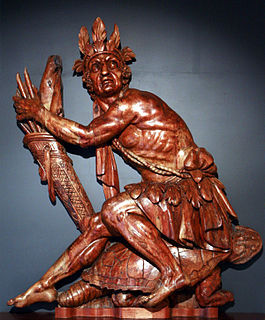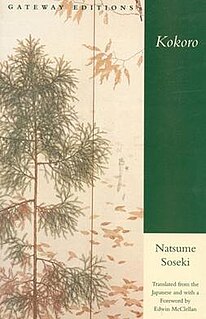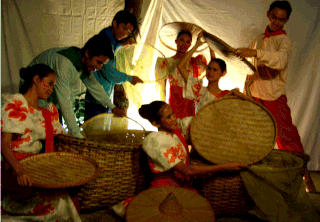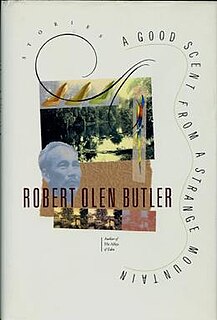
"The Black Cat" is a short story by American writer Edgar Allan Poe. It was first published in the August 19, 1843, edition of The Saturday Evening Post. It is a study of the psychology of guilt, often paired in analysis with Poe's "The Tell-Tale Heart". In both, a murderer carefully conceals his crime and believes himself unassailable, but eventually breaks down and reveals himself, impelled by a nagging reminder of his guilt.
Momus was in Greek mythology the personification of satire and mockery, two stories about whom figure among Aesop’s Fables. During the Renaissance, several literary works used him as a mouthpiece for their criticism of tyranny, while others later made him a critic of contemporary society. Onstage he finally became the figure of harmless fun.

Much of the mythology of the Iroquois has been preserved, including creation stories and some folktales. Recorded in wampum as recitations, written down later, the spellings of names differed as transliteration varies and spellings even in European languages were not entirely regularized. Different versions of some stories exist, reflecting different localities and different times. It is possible that the written versions were influenced by Christianity.

Kokoro is a novel by the Japanese author Natsume Sōseki. It was first published in 1914 in serial form in the Japanese newspaper Asahi Shinbun. While the title literally means "heart", the word contains shades of meaning, and can be translated as "the heart of things" or "feeling". The work deals with the transition from the Japanese Meiji society to the modern era, by exploring the friendship between a young man and an older man he calls "Sensei". It continues the theme of isolation developed in Sōseki's immediately preceding works, here in the context of interwoven strands of egotism and guilt, as opposed to shame. Other important themes in the novel include the changing times, the changing roles and ideals of women, and intergenerational change in values, the role of family, the importance of the self versus the group, the cost of weakness, and identity.

Uncle Remus is the fictional title character and narrator of a collection of African-American folktales adapted and compiled by Joel Chandler Harris, published in book form in 1881. A journalist in post-Reconstruction Atlanta, Georgia, Harris produced seven Uncle Remus books. He wrote these stories to represent the struggle in the Southern United States, and more specifically in the plantations. He did so by introducing tales he had heard and framing them in the plantation context. He wrote his stories in a dialect that represented the voice of the narrators and their subculture. For this choice of framing, his collection has encountered controversy.

The Cay is a teen novel written by Theodore Taylor. It was published in 1969.
Hikari Ōe is a Japanese composer who has autism. He is the son of Japanese author Kenzaburō Ōe and Yukari Ikeuchi, the younger sister of director Juzo Itami.

Philippine mythology is a body of myths, tales, and superstitions held by the Filipinos, mostly originating from beliefs held during the pre-Hispanic era. Some of these beliefs stem from pre-Christian religion that was specially influenced by Hinduism and were regarded by the Spanish as “myths” and “superstitions” in an effort to de-legitimize precolonial beliefs by replacing those native beliefs with colonial Catholic Christian myths and superstitions. Today, some of these precolonial beliefs are still held by Filipinos, especially in the provinces.

An exemplum is a moral anecdote, brief or extended, real or fictitious, used to illustrate a point. The word is also used to express an action performed by another and used as an example or model.

Green Shadows, White Whale is a 1992 novel by Ray Bradbury. It gives a fictionalized account of his journey to Ireland in 1953-1954 to write a screen adaptation of the novel Moby-Dick with director John Huston. Bradbury has said he wrote it after reading actress Katharine Hepburn's account of filming The African Queen with Huston in Africa. The title itself is a play on Peter Viertel's novel White Hunter, Black Heart, which is also about Huston.

The Shadow Out of Time is a novella by American horror fiction writer H. P. Lovecraft. Written between November 1934 and February 1935, it was first published in the June 1936 issue of Astounding Stories.
"An Encounter" is a short story by James Joyce. It is second in a collection of Joyce's short stories called Dubliners.

The Day He Himself Shall Wipe My Tears Away is a novella by the Japanese author Kenzaburō Ōe, first published in Japanese in 1972. It has been translated into English by John Nathan and was published in 1977 together with Teach Us to Outgrow Our Madness, Prize Stock and Aghwee the Sky Monster. The work deals with themes of militarism and emperor-worship through the reminiscences of an unreliable narrator.

A Good Scent from a Strange Mountain is a 1992 collection of short stories by Robert Olen Butler. It received the Pulitzer Prize for Fiction in 1993.
"Sonny's Blues" (1957) is a story, originally published in Partisan Review, by James Baldwin. Baldwin republished the work in the 1965 short story collection Going to Meet the Man.

Betrachtung is a collection of eighteen short stories by Franz Kafka written between 1904 and 1912. It was Kafka's first published book, printed at the end of 1912 in the Rowohlt Verlag on an initiative by Kurt Wolff.
"The Night the Bed Fell" is a short story written by American author James Thurber. The story is a brief account of an event that took place at his house in Columbus, Ohio. It appears as chapter one of My Life and Hard Times.
"The Children of the Night" is a 1931 short story by Robert E. Howard, belonging to the Cthulhu Mythos. It was first published in the pulp magazine Weird Tales in the April/May 1931 issue. Howard earned $60 for this publication.
Son of Angels is a series of young adult Christian fiction novels by Jerel Law. The first book in the series, Spirit Fighter, was released on April 3, 2012 through Thomas Nelson and the second, Fire Prophet, was released on December 11, 2012. The third book, Shadow Chaser was released on May 7, 2013. The fourth book, Truth Runner, was released on November 5th, 2013.

















